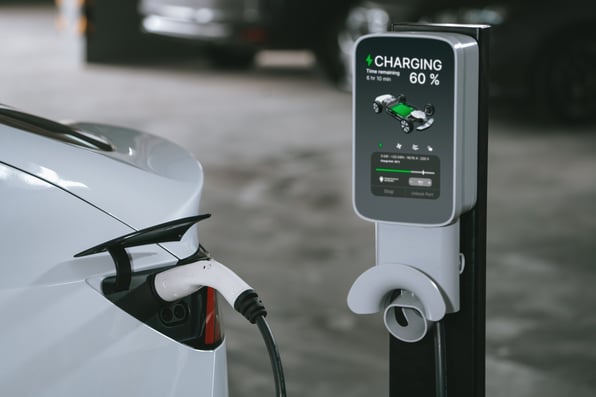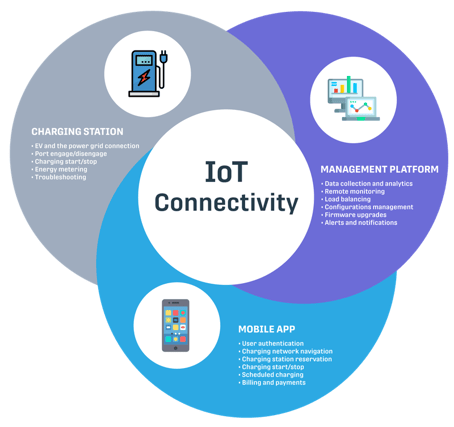

How Does an IoT-Connected EV Charging Station Work?
The electric vehicle (EV) revolution is in full swing, rapidly reshaping the automotive industry. With the growing concern over environmental sustainability and the need to reduce greenhouse gas emissions, more people are turning to EVs as a cleaner and more energy-efficient alternative to traditional gasoline-powered vehicles.
As a result, the demand for Electric Vehicle Charging Stations (EVCS) has surged, and technology has evolved to make them smarter, more efficient, and user-friendly. Enter the world of IoT-connected EV charging stations, where the internet meets EVs, and the future of transportation takes a giant leap forward.
The statistics speak volumes: According to the International Energy Agency (IEA), as of 2021, there were over 11 million electric cars on the road worldwide, marking a substantial increase from previous years.
This remarkable growth underscores the importance of developing advanced charging infrastructure to meet the needs of the burgeoning EV market. In this article, we will explore how IoT-connected EV charging stations work and the multitude of benefits they offer, from enhanced user experience to a more sustainable future.
How IoT-Connected EV Charging Stations Work
At the heart of an IoT-connected EV charging station lies connectivity. These charging stations are equipped with sensors, communication modules, and software that enable them to communicate with electric vehicles, users, and the grid. Here's how it all comes together:
Interaction with Electric Vehicles
When an EV owner approaches an IoT-connected charging station, the station's sensors and communication modules establish a connection with the vehicle. This connection allows the charging station to identify essential details about the EV, such as its make and model, battery capacity, and current charge level.
Armed with this information, the station can tailor the charging process to meet the specific needs of the EV, ensuring an optimal and efficient experience and decreased charging times.
Grid Interaction
IoT-connected EV charging stations are not isolated entities. They are part of a larger energy ecosystem. These stations can communicate with the electrical grid, providing real-time information about grid load, energy demand, and electricity rates.
By staying connected to the grid, the charging station can make informed decisions about when and how to charge the EV to minimize costs and reduce strain on the grid during peak demand periods.

Source: IoT Connectivity: What it Means for EV Charging Stations to Go Wireless
The benefits of an IoT-Connected EV Charging Station: Enhanced Efficiency
One of the most significant advantages of IoT-connected EV charging stations is their ability to enhance efficiency across the board. Here's how:
Smart Charging
Thanks to real-time communication with both the EV and the grid, IoT-connected charging stations can optimise the charging process.
They can adjust charging rates based on grid conditions, prioritize fast charging for EVs with low battery levels, and even schedule charging sessions during off-peak hours when electricity is more affordable. This flexibility benefits EV owners and contributes to a more stable and balanced energy grid.
Load Management
IoT technology allows charging stations to support load management strategies. They can respond to grid signals and adjust their charging patterns to avoid overloading the grid during peak demand.
This capability is crucial as the adoption of EVs continues to grow and places additional stress on the electrical infrastructure.
Remote Monitoring and Management
IoT-connected EV charging stations offer the convenience of remote monitoring and management for station operators. This capability includes:
Usage Statistics
Operators can track usage statistics, providing valuable insights into station utilization, peak usage times, and overall performance. This data can help operators make informed decisions about station deployment and maintenance.
Diagnostics and Troubleshooting
Station operators can perform diagnostics and troubleshoot issues remotely, reducing the need for on-site visits and minimizing downtime. This proactive approach to maintenance ensures that charging stations remain operational and accessible to users.
User-Friendly Experience
IoT-connected EV charging stations are designed with the user in mind, offering a host of benefits that enhance the EV owner's experience:
Easy Accessibility
Drivers can easily locate charging stations using smartphone apps or integrated navigation systems. These apps provide real-time information about station availability, charging speed, and even payment options, making the charging process transparent and hassle-free.
Mobile Payments
Many IoT-connected charging stations support mobile payment options, allowing users to pay for their charging sessions using smartphones. This cashless and convenient payment method eliminates the need for physical cards or cash, streamlining the entire process.
Sustainability
IoT-connected EV charging stations play a pivotal role in promoting sustainability in multiple ways:
Grid Integration
By optimizing charging schedules and drawing electricity from renewable sources when available, IoT-connected charging stations contribute to a more sustainable energy grid. They can align charging with periods of high renewable energy production, reducing carbon emissions associated with EV charging.
Efficient Resource Allocation
These stations can allocate resources efficiently, reducing energy waste. They can ensure charging sessions are tailored to the EV's requirements, avoiding overcharging and energy loss.
Cost Savings
Both EV owners and grid operators can enjoy cost savings thanks to IoT-connected charging stations:
Lower Electricity Costs
EV owners may benefit from lower electricity rates during off-peak hours, reducing the overall cost of EV ownership.
Grid Infrastructure Savings
Grid operators can reduce the need for expensive grid upgrades by managing EV charging intelligently. This not only saves money but also helps maintain grid stability.
Driving Toward a Smarter Future
IoT-connected EV charging stations represent a significant advancement in electric mobility. These intelligent charging facilities offer enhanced efficiency, user-friendliness, and sustainability, benefiting EV owners, charging station operators, and the broader energy ecosystem.
As the global transition to electric vehicles accelerates, IoT-connected EV charging stations will play a pivotal role in shaping the future of transportation.
Here at Velos, we're helping to lead the revolution towards a smarter, greener, and more connected future. Our transportation services help our clients meet their financial goals and adhere to corporate responsibility measures. With a fail-safe multi-network setup in every country, industry leading security, and ability to collect data in real-time, your business can rest assured that your fleet is in good hands.
Contact us today to learn how we can help you increase the efficiency and security of your assets.
Speak to a Velos IoT expert
Related articles


How can IoT Platforms in South Africa help smart city transformation?
Smart cities in South Africa are being transformed with the aid of IoT platforms. Supporting...

5 key IoT concerns that are crucial for Smart City implementation
"Smart City" is a term that gets thrown around a lot these days, along with Internet of Things,...
